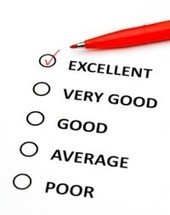 Your new post is loading...
 Your new post is loading...
Here’s the dilemma: In a competitive, complex, and volatile business environment, companies need more from their employees than ever. But the same forces rocking businesses are also overwhelming employees, driving up their fear, and compromising their capacity. It’s no wonder that so many C-Suite leaders are focused on how to build higher performance cultures. The irony, we’ve found, is that building a culture focused on performance may not be the best, healthiest, or most sustainable way to fuel results. Instead, it may be more effective to focus on creating a culture of growth. A culture is simply the collection of beliefs on which people build their behavior. Learning organizations – Peter Senge’s term — classically focus on intellectually oriented issues such as knowledge and expertise. That’s plainly critical, but a true growth culture also focuses on deeper issues connected to how people feel, and how they behave as a result. In a growth culture, people build their capacity to see through blind spots; acknowledge insecurities and shortcomings rather than unconsciously acting them out; and spend less energy defending their personal value so they have more energy available to create external value. How people feel – and make other people feel — becomes as important as how much they know. Building a growth culture, we’ve found, requires a blend of individual and organizational components: An environment that feels safe, fueled first by top by leaders willing to role model vulnerability and take personal responsibility for their shortcomings and missteps.A focus on continuous learning through inquiry, curiosity and transparency, in place of judgment, certainty and self-protection.Time-limited, manageable experiments with new behaviors in order to test our unconscious assumption that changing the status quo is dangerous and likely to have negative consequences.Continuous feedback – up, down and across the organization – grounded in a shared commitment to helping each other grow and get better.
Via The Learning Factor
"There’s a time to stick to your strategy and a time to divert from it."
Precision is the first type. known as tactical performance. It is about rules, checklists, and standard operating procedures and then following them closely. [It’s so that] …Starbucks baristas make your latte the same way across cafés, or when a software engineer delivers the expected features each sprint, you are witnessing tactical performance.
The other is adaptive performance, is how effectively your organization diverges from its strategy. It manifests as creativity, problem solving, grit, innovation, and citizenship. It is how organizations adapt to VUCA - volatility, uncertainty, complexity, and ambiguity, where technology and strategy changes rapidly. …[It when] Starbucks barista adapt their greeting to make you feel personally welcome, or an engineer lean over to help a colleague solve an unexpected problem.
Via Deb Nystrom, REVELN
Are people in your organization energized and happy or anxious and stressed? Does it matter? New research offers important insights into people and what drives performance. Here are three key findings, and a link to download the full report.
Via David Hain
Few people look forward to annual performance reviews. For managers, filling out lengthy forms is an onerous chore, and for employees, infrequent, one-sided appraisals can be a cause for dread. But new data shows companies are adopting shorter, more continuous feedback practices and it’s having a positive impact on their business. A small number of firms like Adobe have been experimenting with simpler, more informal performance reviews for years. Now the practice is gaining wide adoption. “We see this massive re-engineering going on,” says Josh Bersin, a principal at Deloitte and Forbes contributor who oversees the Human Capital Trends report, an annual study of H.R. trends. Of the 10,447 business and H.R. leaders Deloitte surveyed, 71% said they’re either re-evaluating their current performance management system, upgrading it, or have updated it over the past three years.
Via The Learning Factor
There is a world of difference between normal activity and peak performance. It’s the glimpses into the peak state that fuel the intuition that we’re meant for greater things. In this article, we’ll take a look at peak performance and a surprisingly simple strategy for more consistently tapping into our peak mode. The Psychology of Peak Performance Two elements turn ordinary activities into performance activities: 1) we keep score of the outcomes that matter and 2) we institute practice measures to systematically pursue the improvement of our scores. Such deliberate practice lies at the heart of the development of chess players, athletes, Broadway stars, and elite medical facilities. Once we keep score and devote ourselves to a continuous improvement in what we do and how we do it, we transform routine into growth. Recreation is not a cumulative activity. It is activity pursued at the time for its own sake. Peak performance, on the other hand, is cumulative: it’s a focused, ongoing attempt at improvement. We can go to the gym for enjoyment or we can go to the gym to train for aerobic conditioning. The first activity is expressive and present-centered; the second is instrumental and forward-focused.
Via The Learning Factor
Maybe you just bombed the bar exam. Or perhaps you’re terrified that you’re going to get laughed out of the room when you try to sell your product. When the stakes–and your emotions–are high, it’s hard to think positive. But the thoughts that run through your head influence the way your body behaves and if you don’t think like a winner, you’ll struggle to be successful.
Via The Learning Factor
In every office, some employees carry a little more sway than others. Perhaps they’ve amassed enough political capital in the workplace to trade favors with colleagues and persuade supervisors to see things from their point of view. Maybe they can schmooze their way through a sales negotiation or exploit relationships with support staff to smooth the progress of a budget meeting. Recently, some research has suggested that employees who exhibit this type of political proficiency in the workplace also perform better on the job. After all, if politically savvy employees can network more effectively and rally support across different factions of their department or company, it stands to reason that they also have the ability to exert more positive influence over firm-wide affairs.
Via The Learning Factor
To meet this goal, a performance management system must provide some way to determine how employees are performing relative to their co-workers. Yet there is currently a trend in HR to “fix” performance management by eliminating the use of methods that compare employees based on performance.
This makes no sense since this is the very thing senior business leaders want from performance management! The 2 performance management methods:
Via The Learning Factor
Giving actionable EP feedback marks you as a great leader. From our interviews, consensus emerged on what constitutes truly constructive criticism:
Strike while the iron is hot. Deliver the feedback when your employee is most receptive to receiving it: either right before he might blunder or right after he did. For example, upon returning from a conference, Tara, a new addition to Anand's team, got this direction on how to better represent the company in the future: "Look, this job requires a lot of networking. I see, when I take you to events, that you're not mingling except with people on your team. I want you to come back from these gatherings with a stack of business cards. I want you to forge at leave five new relationships and follow up on each of them, because as a member of this team, it's important that potential clients know you personally."
Via The Learning Factor
|
Nearly 70 percent of CEOs now recognize culture as one of the greatest sources of competitive advantage. Whereas company processes, technology, and strategy can be copied, an organization's DNA cannot be reproduced. With this realization, many organizations are turning to cultural change to fuel future growth and performance. Kaiser Associates, a business strategy and consulting firm, defines a high-performing culture as an organization that performs better than its peers in regards to business performance, innovation, employee productivity, and engagement, over a sustained period of time. For now, let's focus on how companies can leverage performance management best practices to build a winning culture.
Via The Learning Factor
Psychologist John Gottman can predict whether or not a married couple will be together five years later with startling 90 percent accuracy. How does he do it? He watches them argue. The ability to engage in healthy, productive debate is not only essential for ensuring a long marriage--it's also the key determinant of high performing teams. A recently released six-year study cites the ability to manage conflicting tensions as the most critical predictor of top-team performance. Berkeley research shows teams that debate their ideas have 25 percent more ideas altogether and that companies like Pixar embrace healthy debate as a vital part of their performance (in its case to make better films).
Via The Learning Factor
Is it possible to be a high-standards, results-driven leader while at the same time building an engaged, fun-to-work-with team? Many people would contend that doing either of these things well makes it almost impossible to succeed at the other. And yet our examination of 360-degree assessment data from more than 60,000 leaders showed us that leaders who were rated in the top quartile of both skills ranked in the 91st percentile of all leaders. It seems that not only is it possible to do both things well, but the best leaders are the very ones who manage to do both. But there aren’t very many of them — specifically, we isolated leaders who ranked in the top quartile on both driving for results and people skills.
Via The Learning Factor
One in four American adults went to a healthcare provider for neck and back pain, according to a 2016 Gallup study. In addition, the report found 65% of adults sought care for neck and back pain at some point in their lives. When you factor in how many adults are hunched over computer desks, sitting for extended periods of time at work and bending their neck to read mobile devices, these statistics aren’t so surprising. Just about everyone has been told to “stand up straight” at some point in their lives—and it turns out that mom was right. Posture is a key element to good health. It is right up there with eating healthy, getting enough sleep and exercising. Bad posture can lead to back, neck and jaw pain, breathing difficulty, balance issues and joint problems. A recent study also found that good posture can improve your mental wellbeing.
Via The Learning Factor
Forget luck. Embrace the right behavior patterns, and you'll be well on your way to success.
Via Bobby Dillard
They shouldn’t be hurried or disorganized.
"If" improves performance when describing a hypothetical positive. Here's a universal truth. No one likes to be wrong, especially in front of other people. When you're facing a lot of "I don't knows" during a brainstorm or tough challenge, there's a word that can alleviate the pressure of being wrong and open up a pathway of critical thinking: If Tim David, author of Magic Words: The Science and Secrets Behind Seven Words That Motivate, Engage, and Influence, employs this magic word in a very specific sentence I plan to borrow a lot: "What would you say if you did know?" As he explains, deploying the magic "if" allows those you're addressing to think hypothetically, taking away the pressure that might prevent them from volunteering an answer.
Via The Learning Factor
Our quest for productivity is the quest to use our time most effectively. One man paid $400,000 to learn this lesson . You can learn it for free.
Via Dan Forbes
Most performance reviews don’t work. They don’t work for two primary reasons. One, no one likes to give them. Two, no one likes to receive them. Yet, we keep doing them. We know that the definition of Insanity is doing the same thing over and over again, yet expecting different results. Somehow, we don’t apply that to performance reviews. We should. Most performance reviews are task oriented and grade the employee on their effectiveness. What if we approached it differently? Dare I ask the question? Am I a heretic? So be it.
Via Dan Forbes
Scientists are not only far from a comprehensive explanation of how the brain works, they can't even agree on the best way to study it. So it's not surprising that myths and misinformation continue to persist —spurred on, in part, by pop culture. But why do we continue to buy into these falsehoods?.
Myth: You are either right- or left-brained dominant. "In reality, we are all whole-brain users." said Shelton. "But this myth helps people define their differences, similar to calling someone male or female. So if you define yourself as right-brained, it immediately connects you with a set of predetermined qualities." Other debunked myths in this useful piece: Myth: You only use 10 percent of your brain. Myth: Alcohol kills brain cells. Myth: Brain damage is permanent. Myth: Your IQ is a fixed number. As always in our ScoopIt news, click on the photo or title to see the full Scooped post. Related tools & posts by Deb: Stay in touch with Best of the Best news, taken from Deb's 9 multi-gold award winning curation streams from @Deb Nystrom, REVELN delivered once a month via email, available for free here, via REVELN Tools. Choices for High Performance Teams, Groups and Psuedo-Teams: Achievement Is How You Say It! 3 Success Factors for High Performance Teams, and What Gets In the Way Are you local to SE Michigan? Find out more about horse-guided leadership development sessions (no fee demos) for individuals by contacting Deb, after reviewing her coaching page here.
Via Deb Nystrom, REVELN
|



 Your new post is loading...
Your new post is loading...








































You need four things to do it.